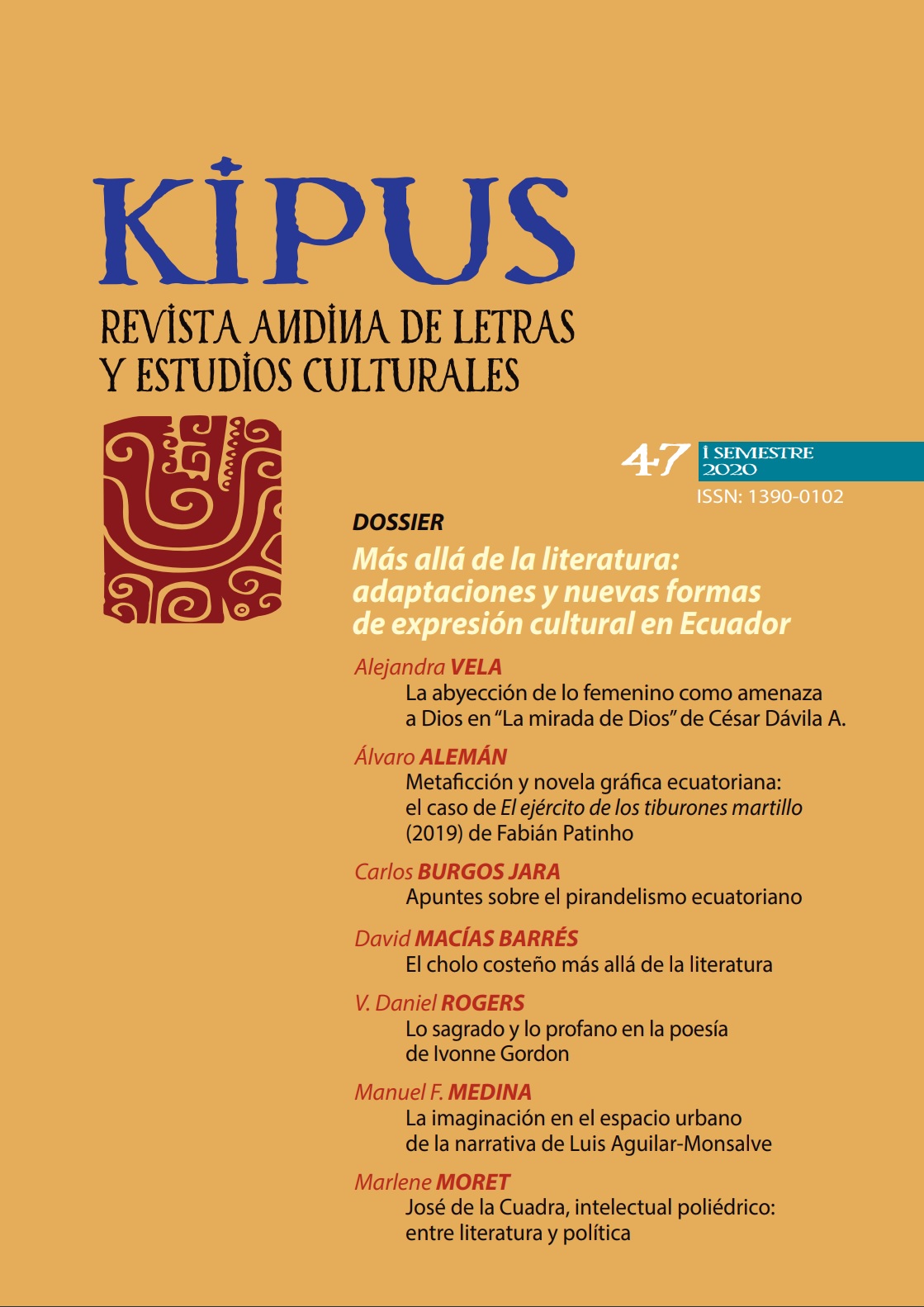Imagination in the Urban Space of Luis Aguilar-Monsalve’s Narrative
DOI:
https://doi.org/10.32719/13900102.2020.47.6Keywords:
Luis Aguilar Monsalve, Ecuador, short story, narratology, narrative voices, city, spaces, representation of realityAbstract
This article poses that the short fiction of Ecuadorian narrator Luis Aguilar Monsalve explores new ways of representing reality. His efforts result in a work on the fringe of the fantastic and the postmodern. A reader can see its narratological desire to step away from mere mimetic representation and successfully attempt to discover new ways of telling that evoke the use of simulacrum, virtual reality, and other models that question the persistence of real time. Within this framework, we find a predilection for narrating the city as a space where human beings often unsuccessfully struggle to communicate with each other in urban areas saturated with human traits and emotions.
Downloads
References
–––. 1995. Huellas y silencios: cuentos. Ambato: Montalvo y Bolívar.
–––. 1999. El umbral del silencio. Quito: El Conejo.
–––. 2000. Breve antología del relato. Cuenca: Casa de la Cultura Ecuatoriana, Núcleo del Azuay / Universidad de Cuenca.
–––. 2001. La otra cara del tiempo: cuentos. Quito: Letramía.
–––. 2002. Dejen pasar al viento: cuentos. Quito: Eskeletra.
–––. 2008. En busca de sor Edwina Marie: novela. Madrid: Editorial Verbum.
–––. 2010. Mínimo mirador: microrrelatos. Madrid: Verbum.
–––. 2019. If winter comes: microrrelatos. Madrid: Verbum.
Alalquiaga, Celeste. 1992. Megalopolis: Contemporary Cultural Sensibilities. Minneapolis: Universidad de Minnesota.
Baudrillard, Jean. 1981. Simulacra and Simulation. Traducido por Sheila Faria Glaser. Ann Arbor: Universidad de Michigan.
Calvino, Italo. 1992 [1972]. Las ciudades invisibles. Traducido por Aurora Bernárdez. Madrid: Siruela.
Donoso Pareja, Miguel. 2008. Cuento ecuatoriano contemporáneo (1927-2008). Caracas: Monte Ávila Editores Latinoamericana.
García Canclini, Néstor. 1997. Imaginarios urbanos. Buenos Aires: Eudeba. Molesworth, Charlos. 1991. “Discourse and the City”. City Images: Perspectives from Literature, Philosophy, and Film, editado por Mary Ann Caws. Nueva York: Gordon and Breach, 12-23.
Poster, Mark. 1995. “Postmodern Virtualities”. Cyberspace/Cyberbodies/Cyberpunk, editado por Mike Featherston y Roger Burrows, 75-95. Thosand Oaks: Sage.
Rogers, Don. 2003. Presentación. En Luis Aguilar Monsalve, Dejen pasar al viento.
Sacoto, Antonio. 2003. El cuento ecuatoriano, 1970-2002. Quito: Casa de la Cultura Ecuatoriana.
–––. 2007. El cuento ecuatoriano, 1970-2006. 2.ª ed. Quito: Casa de la Cultura Ecuatoriana.
Vallejo Corral, Raúl. 1990. Una gota de inspiración, toneladas de transpiración: antología del nuevo cuento ecuatoriano. Quito: Libresa.
Viteri, Eugenia. 1998. Antología básica del cuento ecuatoriano. 5.ª ed. Quito: edición de la autora.
Yánez Cossío, Alicia. 1999. Presentación. En Luis Aguilar Monsalve. El umbral del silencio.
Downloads
Published
How to Cite
Issue
Section
License

This work is licensed under a Creative Commons Attribution-NonCommercial-ShareAlike 4.0 International License.







.png)
